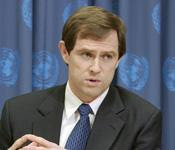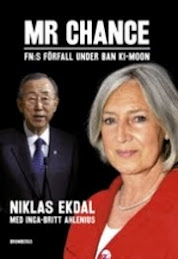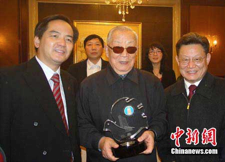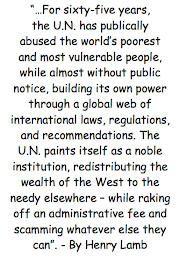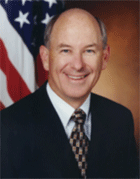FINAL AUDIT REPORT
Audit of DESA’s Global Centre for Information and Communications Technology in Parliament Project: INT05X73
BACKGROUND
In November 2005, the United Nations (UN) Department of Economic and Social Affairs (DESA), in cooperation with the International Parliamentary Union (IPU) and a group of national and regional parliaments, jointly established project INT05X73, the Global Centre for Information and Communications Technology (ICT) in Parliament (the project). Established as a multi-lateral initiative on the occasion of the world summit on the information society (WSIS) in Tunis, Tunisia, the project is an effort to contribute to the empowerment of legislatures around the world to better fulfill their democratic functions by reinforcing parliamentary capacity to harness ICT tools and to place them at the service of the institutional process. The project pursues two main objectives: (a) strengthen the role of parliaments in the promotion of the information society, through fostering ICT-related legislation in light of the outcome of the WSIS; and (b) promote the use of ICT as a means to modernize parliamentary processes, increase transparency, accountability and participation, and improve inter-parliamentary cooperation. The project aims to achieve these objectives by providing a framework for sharing knowledge, coordinating actions, providing technical assistance, and pooling information and resources across legislatures around the world.
DESA’s Office in Rome (the DESA Project Office) serves as the project’s secretariat and is entrusted with achieving the project’s objectives and expected accomplishments, along with discharge of its day-to-day administrative and financial management functions. The DESA Project Office reports on the implementation of the project to an external high-level board (the Board), nominated by the UN, in cooperation with IPU, and to an advisory committee designated by the Board. Within DESA, the project reports substantively to the Division of Public Administration for Development Management (DPADM) and administratively to the Capacity Development Office (CDO). DPADM provides substantive backstopping of the project’s planning, implementation, and reporting responsibilities, while CDO provides administrative and financial management support. The project is headed by the Head of the DESA Project Office at the D-1 level, and assisted by three professional staff at the P-5, P-4, and P-3 levels and consulting experts. Table 1 presents the financial data for the project for the period from 1 November 2005 to 31 December 2009:
Table 1: Project’s Selected Budget Information (2005-2009) (in US dollars)
In its 2011 risk-based audit plan, the Office of Internal Oversight Services (OIOS) identified DESA-operated technical cooperation projects as a high risk area on the basis of the nature of their significant reliance on voluntary funding and related capacities to achieve project objectives.
OBJECTIVE AND SCOPE
The audit was conducted to assess the adequacy and effectiveness of the DESA project’s risk management, control and governance processes in providing reasonable assurance regarding the achievement of its objectives. The key controls tested included those related to: (a) fundraising; (b) financial forecasting; (c) governance; (d) risk management and strategic planning; and (e) project performance reporting. The audit covered the project’s activities related to the five key controls for the period from 1 November 2005 to 31 March 2011.
AUDIT RESULTS
In OIOS’ opinion, the project’s risk management, control and governance processes examined were partially satisfactory to provide reasonable assurance regarding the achievement of its objectives.
The project’s governance mechanisms, comprising an independent high-level board and advisory committee, and DPADM and CDO within DESA were adequate to oversee its activities. The project also had strong leadership to carry out its activities and to account for results. The project performance reporting framework had been instituted to report on project performance and utilization of resources. However, there were areas in need of improvement, as outlined below.
A formal fundraising strategy had not been formulated
The project did not have a fundraising strategy to secure the required funding in a timely manner to support the project’s activities. As of March 2011, only $5.3 million, or 31 per cent, of the total $16.6 million project budget had been secured. Reliance on the Government of Italy as the main donor and lack of a strategy to diversify funding sources exposed the project to undue financial risk and uncertainty.
(1) DESA should prepare a comprehensive fundraising strategy that commits the Board, the International Parliamentary Union, and other stakeholders to ensure the financial sustainability of the Global Centre for Information and Communications Technology in Parliament Project INT05X73.
DESA accepted recommendation 1 and agreed to prepare a formal fundraising strategy in the context of the second phase of the Centre, 2012 and beyond. Recommendation 1 remains open pending receipt of a copy of a comprehensive fundraising strategy from DESA.
Contributions from partners and collaborative arrangements were not adequately recorded
The project had received contributions in-kind from partners and collaborative arrangements, which were crucial value-adding support to the project’s sustainability and to subsidizing project costs in lieu of cash contributions. According to the DESA Project Office, approximately $3 million was received as in-kind contributions during the period. The tracking of such contributions, therefore, was essential to monitor the project’s inputs, as well as forecast its financial requirements on an ongoing basis. Monitoring such contributions was also essential in the discharge of DPADM’s oversight over the appropriateness of acceptance from partners of contributions and collaborative arrangements by the project. The DESA Project Office generally reported these contributions and collaborative arrangements to the Board, but there was no formal requirement to track, account for, and report them to provide accurate information on project costs. In the absence of adequate records for such contributions, there is no assurance that all project contributions and costs are properly accounted for.
(2) DESA Project Office should record all contributions in-kind from partners and collaborative arrangements and report periodically to the Board and the Division of Public Administration for Development Management to provide accurate information on project costs.
DESA partially accepted recommendation 2 and stated that there is an intrinsic value in informing the Board of all partnership arrangements, in accordance with ST/SGB/2006/5. The project will include a distinct section on such arrangements in its future reports to the Board, although no cost will be associated to these arrangements. OIOS maintains that it is important for project costs to be inclusive of all contributions, and reiterates recommendation 2, which will remain open pending action by DESA.
End-of-term evaluation and formal exit strategy of the project are pending
In strategically planning the project, evaluation was identified as a necessary component of monitoring results and activities during the mid-term and at the completion of project. The project document, therefore, called for two independent evaluations to be conducted on the achievements of its objectives; however, the mid-term evaluation was never conducted. Furthermore, no exit strategy was prepared for the project, which is scheduled to end on 31 December 2011. Without an exit strategy there is the risk that intellectual property assets could be lost after the project is ended.
(3) DESA should conduct the end-of-term evaluation and prepare an exit strategy for the Global Centre for Information and Communications Technology in Parliament Project INT05X73 prior to its extension or termination.
DESA accepted recommendation 3 and stated that it will prepare an end-of-term evaluation and exit strategy prior to the project’s extension or termination. Recommendation 3 will remain open pending receipt of evidence that end-of-term evaluation and exit strategy have been conducted.
ACKNOWLEDGEMENT
I. INTRODUCTION
1. The Office of Internal Oversight Services (OIOS) conducted an audit of the operations of the Department of Economic and Social Affairs’ (DESA) Global Centre of Information and Communications Technology (ICT) in Parliament project INT05X73 (the project) located in Rome, Italy.
II. AUDIT OBJECTIVE
2. The audit was conducted to assess the adequacy and effectiveness of the project’s risk management, control and governance processes in providing reasonable assurance regarding the achievement of its objectives. The key controls tested for the audit included those related to: (a) fundraising strategy; (b) financial forecasting capability; (c) governance; (d) risk management and strategic planning; and (e) project performance reporting. These key controls are defined as follows:
(a) Fundraising strategy - controls designed to provide reasonable assurance that the project has the necessary funding to achieve its objectives and expected accomplishments.
(b) Financial forecasting capability - controls that provide reasonable assurance that the project has the ability to forecast contribution receipts and mitigate risks related to its sustainability.
(c) Governance - controls that provide reasonable assurance that the project has proper independent and internal governance and oversight mechanisms to oversee the project’s activities and ensure accountability.
(d) Risk management and strategic planning - controls designed to provide reasonable assurance that risks relating to achievement of the project’s objectives and expected accomplishments are identified and assessed, and that action is taken to anticipate, avoid, mitigate, or manage risks.
(e) Project performance reporting - controls that provide reasonable assurance that the substantive results of the project’s activities and the utilization of the allocated financial resources are accurately and completely reported in a timely manner.
III. AUDIT SCOPE AND METHODOLOGY
3. OIOS conducted the audit from January to March 2011. The audit covered project activities related to the period from 1 November 2005 to 31 March 2011.
4. To gain a general understanding of the project’s operations, OIOS reviewed the project document, organizational structure, terms of reference of the Board and Advisory Committee, agendas and minutes of board meetings, annual work plans and cost plans, financial authorizations, monthly financial imprest reports, progress reports, financial statements, publications and other outputs, staffing table, job descriptions, and other relevant information. OIOS also reviewed the project’s public website and obtained project statistical data and other documentation. In addition, OIOS reviewed reference documents contained in the report of the World Summit of the Information Society (WSIS) held in Tunis, Tunisia in 2005. OIOS also conducted interviews with DESA officials in New York and Rome.
5. To assess the adequacy of internal controls, OIOS considered whether the selected key controls provided reasonable assurance that DESA managed the project effectively to achieve its objectives and conducted relevant tests to assess whether policies and procedures were implemented consistently.
IV. OVERALL ASSESSMENT
6. In OIOS’ opinion, the project’s risk management, control and governance processes examined were partially satisfactory to provide reasonable assurance regarding the achievement of its objectives. The project’s governance mechanisms, comprising an independent high-level board and advisory committee, and DPADM and CDO within DESA were adequate to oversee its activities. The project also had strong leadership to carry out its activities and to account for results. The project performance reporting framework had been instituted to report on project performance and utilization of resources. However, there were areas in need of improvement as outlined below.
V. AUDIT RESULTS
A. Fundraising strategy A formal fundraising strategy had not been formulated
7. The project did not have a fundraising strategy to secure the required funding to support the project’s inputs, activities and outputs in a timely manner. As of March 2011, only $5.3 million, or 31 per cent, of the total $16.6 million project budget had been secured. The Government of Italy contributed $5.1 million or 93 per cent of the total contributions received, while the European parliament, together with the Government of Honduras, contributed $64,298, or one per cent of the total receipts. While the project had partially been successful in overcoming this funding gap through receipt of contributions from partners and collaborative arrangements, reliance on the Government of Italy as the main donor and the lack of a strategy to diversify funding sources exposed the project to undue financial risk and uncertainty.
8. Moreover, although the Board had responsibility to ensure proper fundraising and advocacy for the project’s activities, in practice, the Head of the DESA Project Office was mainly responsible for mobilizing funds and reported annually the project’s financial situation to the Board and DESA. However, there was no clear evidence of the involvement by the Board, IPU, or DESA in fundraising efforts to address the adverse situation. As a result, opportunities to leverage the individual and collective strengths of all stakeholders to mobilize resources, including their broad experience and networks, as well as to improve the project’s access to donors and exploit all fundraising options, could not be pursued effectively.
Recommendation 1
(1) DESA should prepare a comprehensive fundraising strategy that commits the Board, the International Parliamentary Union, and other stakeholders to ensure the financial sustainability of the Global Centre for Information and Communications Technology in Parliament Project INT05X73.
B. Financial forecasting Gaps in project budget and actual contributions
10. The Government of Italy approved its initial contribution of $1.6 million in 2005. However, the bulk of its contributions amounting to $3.5 million was not received until 2008. Although a vacancy announcement had been published on Galaxy in October 2006 for recruitment against the Executive Coordinator’s post, the Head of the DESA Project Office in Rome was requested in May 2007 to concurrently serve as the Head of the DESA Project Office ad interim due to insufficient funding. The project could not forecast when the position of the head of the DESA Project Office could be filled with a full-time person.
11. Timing of the actual receipt of contributions also affected the project’s capacity to undertake technical assistance missions, a main component of the project, to respond to the growing need of parliaments in developing and transitioning countries in the implementation of ICT initiatives. These activities, which had a planned budget of $775,000, were limited to only three missions prior to the late recruitment of the P-5 professional. Once the P-5 professional was hired in 2010, the project was able to schedule technical missions to developing countries in Africa, Europe, and the Caribbean, over four years into the project. Limited finances also affected the ability to forecast financial feasibility of translating publications into the UN official languages other than English. Due to limited funding, only 5 out of 16 publications were produced in French, while only two were produced in Spanish. Outreach across the UN official languages, therefore, was limited.
12. Earmarking of the contributions also affected the project’s financial forecasting capability. For example, the European Parliament paid $128,174, but the full contribution was earmarked to pay for the costs of travel for participants of a project-related conference and any savings from the contribution were required to be refunded to the donor. In this case, the project refunded to the European Parliament approximately $15,250, effectively reducing contribution income. The Head of the DESA Project Office was ultimately able to secure contributions from partners and collaborative arrangements to defray project costs and implement planned activities, but this was mainly done on an ad hoc basis and not without reduction to the project’s planned activities. As of March 2011, the project had forecasted a budget of $25 million to extend the project from 2011-2020 and this forecast is not supported by prospective donors.
13. DESA’s financial forecasting capability for the new project could be strengthened by the procurement of a predictable supply of contributions resulting from a comprehensive fundraising strategy committing all project stakeholders. DESA stated that financial forecasting is fully dependent upon commitments of donors which are formalized through contribution agreements.
Contributions from partners and collaborative arrangements were not adequately recorded
14. The project had received contributions from partners and collaborative arrangements of: (a) two associate experts from the Government of Italy and the Government of the Netherlands; (b) conference facilities at the world e-parliament conference in 2007, 2008 and 2009; (c) services and expertise of parliamentarian staff for assessment missions; and (d) resource persons for training and workshops, and daily subsistence allowance subsidies for parliamentarians traveling from developing countries to attend international meetings. These contributions from partners and collaborative arrangements, which were received between 2007 and 2011, were reported to the Board, in general, but were not accounted for in
15. Contributions from partners and collaborative arrangements were crucial value-adding support to the project’s sustainability and they subsidize project costs in lieu of cash contributions. The tracking of such contributions, therefore, was essential to monitor the project’s inputs, as well as forecast financial requirements on an ongoing basis. Monitoring such contributions was also essential to DPADM’s oversight over the appropriateness of acceptance from partners of contributions and collaborative arrangements by the project. However, there was no formal requirement to track, account for and report contributions to the Board and DPADM.
Recommendation 2
(2) DESA Project Office should record all contributions in-kind from partners and collaborative arrangements and report periodically to the Board and the Division of Public Administration for Development Management to provide accurate information on project income and costs.
16. DESA partially accepted recommendation 2 and stated there is an intrinsic value in informing the Board of all partnership arrangements, in accordance with ST/SGB/2006/5. The project will include a distinct section on such arrangements in its future reports to the Board, although no cost will be associated to these arrangements. OIOS maintains that it is important for project costs to be inclusive of all contributions, and reiterates recommendation 2, which will remain open pending action by DESA.




